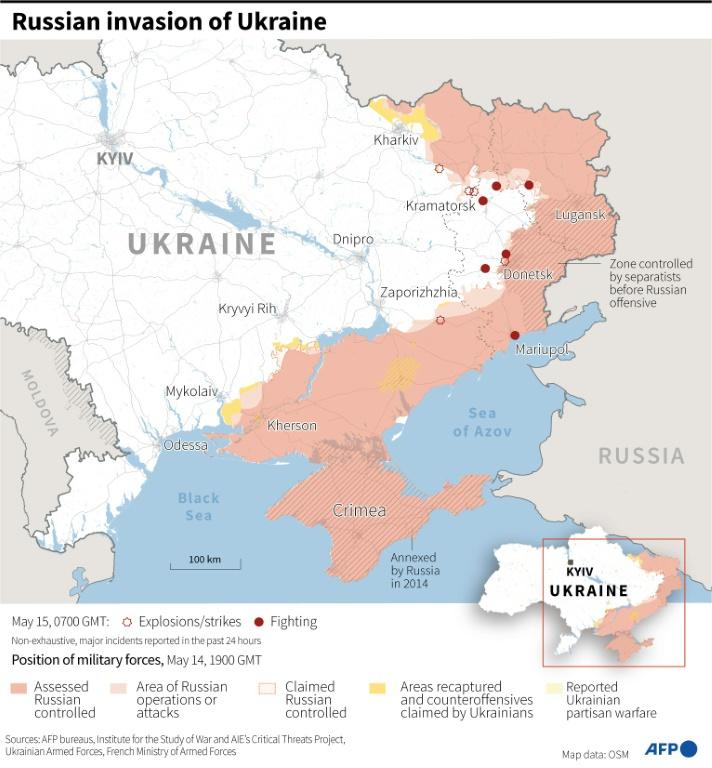
Russian President Vladimir Putin warned Finland and Sweden on Monday to expect a “response” for applying to join NATO as Ukraine braced for a new push by Moscow’s forces in its eastern Donbas region.
Swedish Prime Minister Magdalena Andersson on Monday confirmed her country would apply to join the military alliance, the day after Finland — which shares a 1,300-kilometre (800-mile) border with Russia — said the same.
The two Nordic countries are poised to give up decades of military non-alignment over fears they could be next in line following Moscow’s invasion of Ukraine on February 24.
Russia, whose war has sparked global outrage, killed thousands and created millions of refugees, warned that NATO’s expansion would have consequences.
The move poses “no direct threat for us… but the expansion of military infrastructure to these territories will certainly provoke our response”, Putin told a meeting of a Moscow-led security alliance.
Deputy Foreign Minister Sergei Ryabkov had earlier called it a “grave mistake with far-reaching consequences”.
Russia has already suspended electricity supplies to Finland, citing payment issues.
But Finnish Prime Minister Sanna Marin told lawmakers: “Our security environment has fundamentally changed.
“The only country that threatens European security, and is now openly waging a war of aggression, is Russia.”
– Kharkiv battles –
Despite the resources of its giant neighbour, Ukraine has managed to repel Russian forces for longer than many initially expected, fortified by weapons and cash from Kyiv’s Western allies.
NATO on Sunday promised open-ended support, with German Foreign Minister Annalena Baerbock saying the alliance would provide military assistance “for as long as Ukraine needs”.
Ukraine’s defence ministry announced its troops had regained control of territory on the Russian border near the country’s second-largest city of Kharkiv, which has been under constant attack.
“We thank everyone who, risking their lives, liberates Ukraine from Russian invaders,” Kharkiv regional governor Oleg Synegubov said, adding: “We still have a lot of work ahead of us.”
Since failing to take the capital Kyiv in the early weeks of the war, Moscow is currently focusing on Donbas, near the Russian border and home to pro-Russian separatists.
However, Western intelligence has predicted its campaign will stall amid heavy losses and fierce resistance.
“We are preparing for new attempts by Russia to attack in Donbas, to somehow intensify its movement in the south of Ukraine,” Ukrainian President Volodymyr Zelensky said in his nightly address Sunday.
Presidential adviser Oleksiy Arestovich told local television Sunday that Russian troops were being redeployed towards Donbas after withdrawing from Kharkiv.
They were being sent towards Lugansk and “their task is to take Severodonetsk,” the easternmost city still held by Ukraine.
The fall of Severodonetsk would grant the Kremlin de facto control of Lugansk, one of two regions — along with Donetsk — that comprise Donbas.
– Heavy losses –
But Russia’s attempt to cross a river to encircle it has been repelled with heavy losses of equipment, while Russian-occupied railway bridges were blown up, Ukrainian officials said.
Russia continued strikes on the Lugansk region, south of Kharkiv, killing two people and injuring nine during shelling of a Severodonetsk hospital, the Ukrainian presidency said Monday.
Later Monday the Ukrainian side said a further ten people were killed by Russian strikes on Severodonestsk, according to the local governor.
Separately, police in the neighbouring Donetsk region reported that six civilians were killed and 12 wounded in Russian shelling that hit 10 settlements in the area over the past 24 hours.
Six million refugees have fled Ukraine since the war began, and another eight million have been internally displaced, according to UN agencies.
But some are trying to wait it out.
In Lysychansk, on the other side of the river from Severodonetsk, a policeman tried in vain to evacuate Angelina Abakumova and her children.
“It is dangerous here now. Then it changes and it becomes dangerous over there. What is the point of going back and forth?” she told AFP, on her way back to her basement.
But the battles here have grown in number as the Russians try to gain control of hills overlooking a road providing Lysychansk’s last link to the outside world.
“The people who sit here just think that everything will be fine,” said the policeman, Viktor Levchenko, of the dozens hiding in the underground corridors and intertwining basements of one of the city’s more fortified buildings.
“But unfortunately, everything is not fine.”
One of the war’s most symbolic battles has been the fight for Mariupol, the southern port city which has largely fallen to Russian forces except for final hold-outs at the Azovstal steel plant.
Russia’s defence ministry said Monday it had reached a deal to evacuate wounded soldiers from the plant, where hundreds of Ukrainian troops remain holed up in underground tunnels.
There was no immediate confirmation from Ukrainian officials of the deal.
A group of women whose partners are fighting at Azovstal have been touring European nations in recent weeks, seeking support for the embattled fighters.
“We don’t know which country can really help us. That’s why we are reaching out to everyone,” Olha Andrianova, 30, told AFP in Paris after visiting Poland, Germany and the Vatican, where they briefly met Pope Francis.
– EU meets on oil ban –
Ukraine’s Western allies have imposed unprecedented economic sanctions on Moscow to punish it for the invasion, but at the same time, European nations continue to buy Russian oil and gas.
EU foreign ministers met Monday in Brussels to discuss a proposed ban on Russian oil being blocked by Hungary, which warned of the huge economic cost.
Portugal’s Foreign Minister Joao Gomes Cravinho said it could take “a couple of weeks” to hammer out agreement, a timescale that would take the debate up to the next full summit of EU leaders.
The war meanwhile is taking its toll on the continent’s growth. The European Commission sharply cut its eurozone forecast for 2022 to 2.7 percent, blaming skyrocketing energy prices.
Separately, French automaker Renault has handed over its Russian assets to the Russian government, marking the first major nationalisation since the onset of sanctions.
Renault controlled 68 percent of AvtoVAZ, the largest carmaker in Russia with the country’s top brand Lada, but had been under pressure to pull out of Russia following the invasion.
bur-ar/gw




